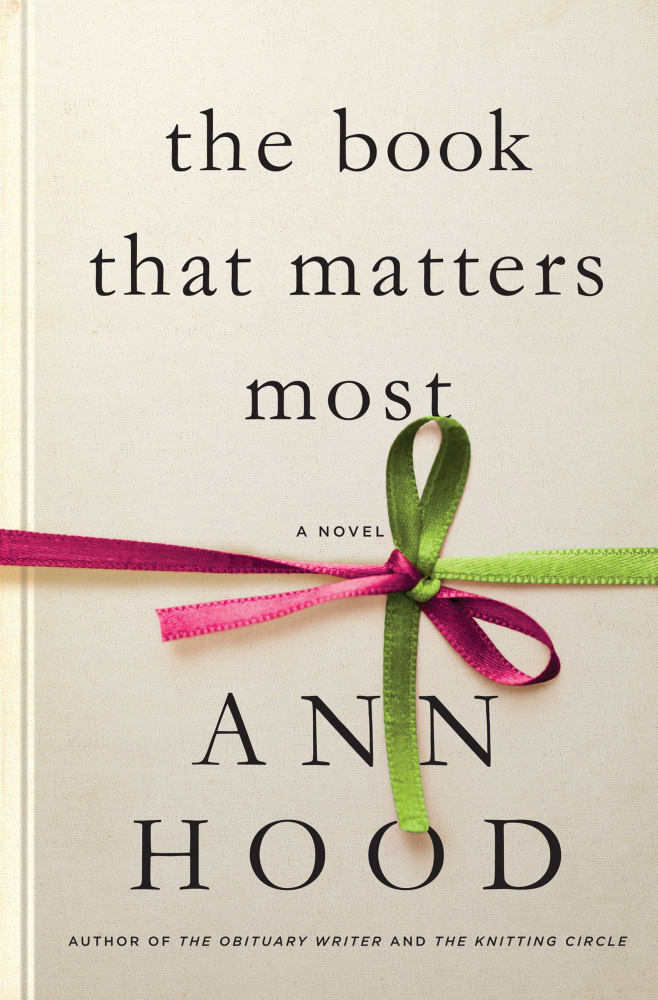Ann Hood’s latest novel, “The Book That Matters Most,” is a compassionate read about ordinary loss, shame and the human desire to escape. With an overarching nod of appreciation for books and how, often unexpectedly, they help people navigate their own lives, the author meshes together the fictitious personal pain of her characters with the real, healing power of literature.
Grappling with the heartbreak of her recent divorce and looking for something new, the story’s main character, Ava, joins a book club. There, she and the other members are tasked with selecting one book that has mattered most to each of them to compile the club’s reading list. From “Anna Karenina” to “Slaughterhouse Five,” Hood’s built-in recommended reading list serves as a clever guide as Ava’s story of loss and recovery unfolds.
Ava goes on the hunt to find a novel she read as a young girl after the tragic death of her sister and her mother’s subsequent suicide. Her past, present and future quickly and unexpectedly become tied together by the search for “From Clare to Here,” the book that matters most to Ava. The storyline is broken up by the perspectives of other characters, including flashbacks of Ava’s mother and Hank, a retired detective who investigated the young sister’s death and who Ava recruits to help track down the missing book. The most important of these additional threads is Maggie, Ava’s daughter. Studying abroad in Europe and lost in her drug addiction, the same allegorical tale Ava is searching for coincidentally comes into Maggie’s life. This book serves as the unifying element for these three generations of women, who have each sought an escape, be it by suicide, adultery, drugs or delving into the fantasy of fiction. “From Clare to Here” is the saving grace, bringing them first back to themselves, then reuniting these mothers and daughters. The meshing together of all the novel’s elements is almost too convenient or precious, but Hood’s direct, honest writing triumphs.
The main characters in “The Book That Matters Most,” are humanized by shortcomings that Hood acknowledges non-judgmentally, as each becomes something they never anticipated: divorced, a drug addict, healed. With subtle intimations that all people are fallible, Hood maintains a respect for her characters, despite their tragic mistakes. She writes openly and with fairness, careful that none are vilified for their faults. The women have their own truth, and though they are not absolved of their wrongs, they are mourned for them.
If the ugly truth was a chair, Hood has a way of making it a comfortable place to sit. Her writing does not skirt around unpleasant issues, rather it cozies up to them, fearlessly and still accepting her characters as whole human beings. Despite several heavy topics in this novel, Hood’s writing maintains a sense of humor that lightens the read, such as when Ava jots down quotes in her Moleskin notebook, “bought to show the others how serious she was about being part of the book group.” Likewise, Hood’s large appreciation for reading threaded throughout “The Book that Matters Most” highlights the wonderful companionship that books offer and, in turn, creates a sense of comfort for the reader. These are not characters through whom readers will want to live vicariously, but they won’t soon forget the empathy of Hood’s fiction.
Marae Hart is a graduate of the University of Iowa and the Salt Institute. She is a freelance writer and can be contacted at:
marae.hart@gmail.com
Send questions/comments to the editors.



Success. Please wait for the page to reload. If the page does not reload within 5 seconds, please refresh the page.
Enter your email and password to access comments.
Hi, to comment on stories you must . This profile is in addition to your subscription and website login.
Already have a commenting profile? .
Invalid username/password.
Please check your email to confirm and complete your registration.
Only subscribers are eligible to post comments. Please subscribe or login first for digital access. Here’s why.
Use the form below to reset your password. When you've submitted your account email, we will send an email with a reset code.